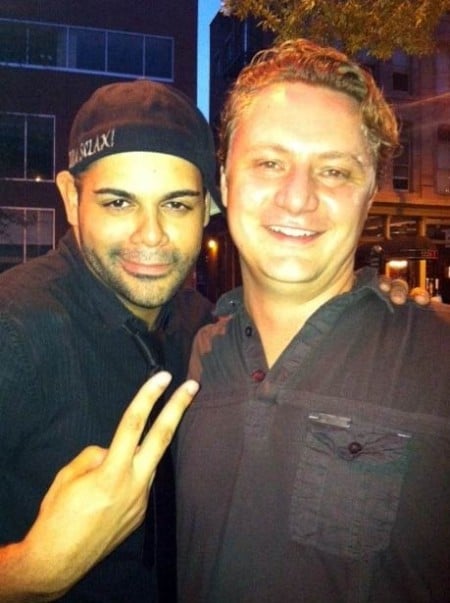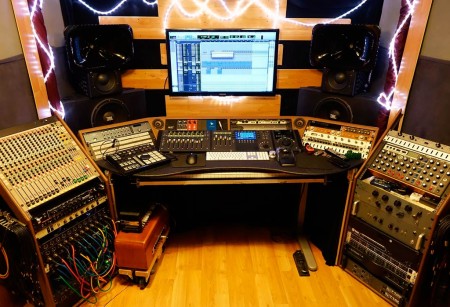Hailing from Denver, CO, veteran music producer and Recording Connection mentor Ryan Conway has operated his own studio, Conway Sound, for the past sixteen years. As such, he’s had the opportunity to work with such artists as Ghostface Killah, Prodigy (of Mobb Deep), Eddie Fisher of OneRepublic and others. In a recent interview with RRFC, Ryan chatted about how he ventured into producing, and offered helpful advice and insights for students about self-marketing and adapting to changes in popular music.
RRFC: So how did you get into this field of music production? Was this something that you’ve always wanted to do?
Ryan Conway: I kind of started more focused, I guess, on being a professional musician, and I did that a lot for a while. But the whole time, I’ve always had a lot of interest in production and the recording side of things, so it just sort of naturally grew from the one to the other.

Recording Connection mentor Ryan Conway (right) of Conway Sound
Sixteen years.
RRFC: And what would you say Conway Sound works with the most genre-wise? Would it be hip hop or rock?
Ryan: It’s pretty balanced between different things, a fair amount of rap stuff, a fair amount of—like, I have a publishing deal with a company out in L.A. and do hip hop stuff for them mostly…but then, I’m working towards doing more, I don’t know what you would call it genre-wise. A lot of my newer projects might be most similar to something like Chet Baker or something like that…something like “musical EDM.”
RRFC: When you’re mentoring different apprentices, how do you go about making sure that they’re getting what they need out of the program? Aside from becoming an engineer, some people, they want to be singers or composers or producers. Do you guys talk about that before they get started?
Ryan: Yeah. I would say, so far, a lot of the students that are coming in are wanting to have at least a production focus, or that’s kind of what they’re interested in getting from me or partially interested in. So I mean, my approach with that, especially the first six chapters, you know, they tend to run more in the direction of the acoustics and just the kind of physics and the background of how sound works and that kind of thing. I sort of teach all of that with the context of basic subtractive synthesis… then we just sort of add on all of those things as well. Some of the chapters about organizing for a session, I kind of try to gear that towards the more practical stuff that they would need to deal with.

Control Room in Conway Studios
Yeah…I’ve kind of been all over and almost even coming back around again. It’s kind of a weird industry in that nature. But I am always telling people “If you really stop to think about it, hopefully your career will outlast the genre that brought you in”…Whatever style of music you’re into right now, it might not even be cool anymore by the time you’re just really getting going.
RRFC: Do you ever feel like some of the biggest people in the industry are still trying to figure it out themselves?
Ryan: Oh, yeah, sure…I just did a session recently with Eddie Fisher, the drummer from OneRepublic… It was kind of wild to me to think that “Counting Stars” has almost a billion YouTube views. It doesn’t get a whole lot more successful than that with the band side of the world, and he’s already trying to figure out what his next step is going to be. It’s interesting.
RRFC: Do you have any apprentices that are standing out to you lately?
Ryan: Yeah. I mean, I have this guy, Josh [Denhart]…He’s been doing pretty good and getting more and more busy and he’s one guy who’s been doing a lot of stuff…moving in the right direction to get his music career going as far as doing some DJ gigs and some production work and some of that stuff….I have a student here, Uriah Halbeisen…it seems like he’s doing more and more work. He’s a working on a mix right now for his master’s project. He’s got a pretty good hustle going on.
RRFC: Do you have any tips that you give to your apprentices on how to self-market, getting gigs?
Ryan: I think the hardest part I see with anybody is kind of taking those first steps and getting up the nerves to go approach an artist or a band or whatever and just say “Hey, you guys sound great. Blah, blah, blah” and kind of see where it goes…Then also, I’m always kind of thinking for people to look for some sort of kind of side hustles they can get going on in the music world, because there’s so many little avenues out there in the world and, to me, it seems like half of the struggle for people is just how to get themselves a good base to where they’re not working a 40-plus and commuting job and then having just a tiny bit of gas left in the tank at the end of the day to try to get their music stuff going. So whatever you can do. People can get Internet stuff going on, wherever they’re comfortable, but look for those things that allow you to kind of build.





